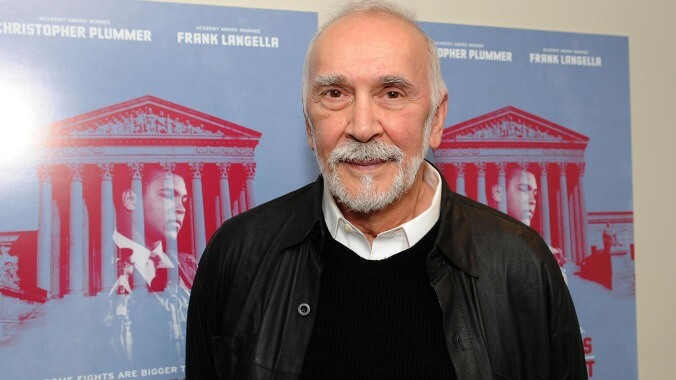Frank Langella declares himself "canceled" after Netflix firing
By his own admission, Langella told The Fall Of The House Of Usher's intimacy coordinator that their input was "absurd" before filming a love scene

It’s been three weeks now since reports began circulating that veteran actor Frank Langella had been fired from Netflix and Mike Flanagan’s production of The Fall Of The House Of Usher, after an investigation into his conduct on the miniseries’ set found that Langella had exhibited inappropriate behavior toward his co-stars. Beyond Netflix announcing that Gerald’s Game’s Bruce Greenwood was being brought on to fill the role of Roderick Usher, everyone involved in the production has been decidedly quiet about the incident—until today, when Langella penned a lengthy statement to Deadline in which he claimed that his treatment by the streamer was “not fair,” “not just,” “not American,” and that he had been “canceled,” a popular online term which here refers to being invited to give his version of events in a guest column in a major trade publication.
In said guest column, Langella recounts his version of the events that led up to his firing, an account that does not, in fact, come off as the hero moment for veteran actor Frank Langella that he appears to think it might. Specifically, and by his own admission, Langella recounts dismissing the input of the show’s intimacy coordinator for a love scene with a fellow performer, claiming, “It was a love scene on camera. Legislating the placement of hands, to my mind, is ludicrous. It undermines instinct and spontaneity.” During said sequence (after Langella told the coordinator that their advice was “absurd”), Langella’s co-star accused him of touching her leg in a way that hadn’t been agreed to in the blocking for the scene, and left the set.
The intimacy coordinator position is a fairly new addition to Hollywood sets, with its wider adoption spurred on by increasing awareness of harassment and inappropriate conduct; the job covers a lot of bases, but at its core typically boils down to ensuring that all participants in a sex scene are comfortable with everything that’s happening and that, say, they aren’t being touched in a way they didn’t agree to by a co-star who doesn’t grasp that “instinct and spontaneity” hit their limits at their co-worker’s bodies.
Anyway, Langella also notes that some of the other allegations against him include assertions that he “told an off-color joke,” that he referred to people on the set as “baby or honey” and that “he’d give a hug or touch [a] shoulder.” All of these, in Langella’s telling, fall under the heading of setting “an example by keeping the atmosphere light and friendly,” despite not sounding like they did much to keep the atmosphere on Usher all that light and friendly.
Langella goes on at fairly prodigious length about how he feels hard done by this whole ordeal (“The impact on me has been incalculable,” etc.) but his column is mostly interesting from an outside perspective in so far as it gives us a ground-level (if biased) look at how Netflix’s investigative process works. Which sounds pretty efficient and to the point, at least in this example. Roughly a week after the incident, Langella was on the phone with Netflix HR, asking him specifically about his interactions with the intimacy coordinator.
Toward the end of our conversation, [the investigator] suggested that I not contact the young lady, the intimacy coordinator, or anyone else in the company. “We don’t want to risk retaliation,” she said. When I mentioned that it was certainly not my intention to… she cut me off politely and said: “Intention is not our concern. Netflix deals only with impact.”
Ultimately, Langella writes, “I was fired. I was not given a hearing with Netflix. My request to meet one-on-one with the actress was denied. The directors and the producer stopped answering my emails and phone calls. Within 30 minutes of my firing, a letter went out to cast and crew and a full press release was sent immediately. My representatives and I were given no opportunity to comment or collaborate on the narrative.” The last part of which, it seems, has now been addressed; Langella is certainly shaping the narrative, even if it’s not clear that it’s being molded into the shape that he intends.